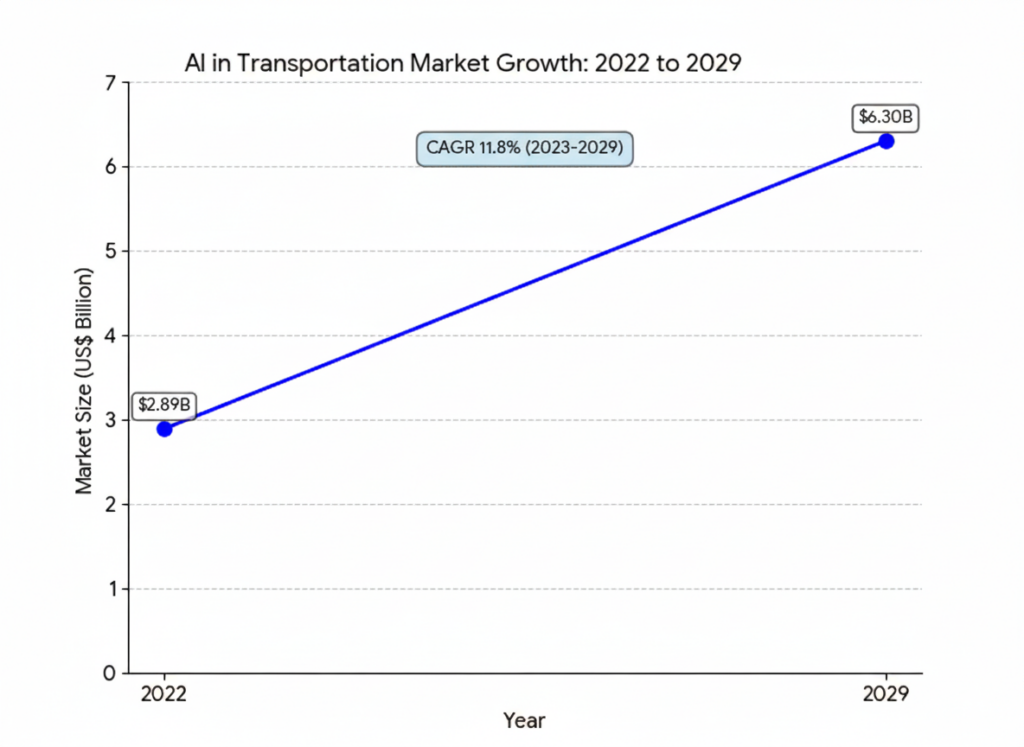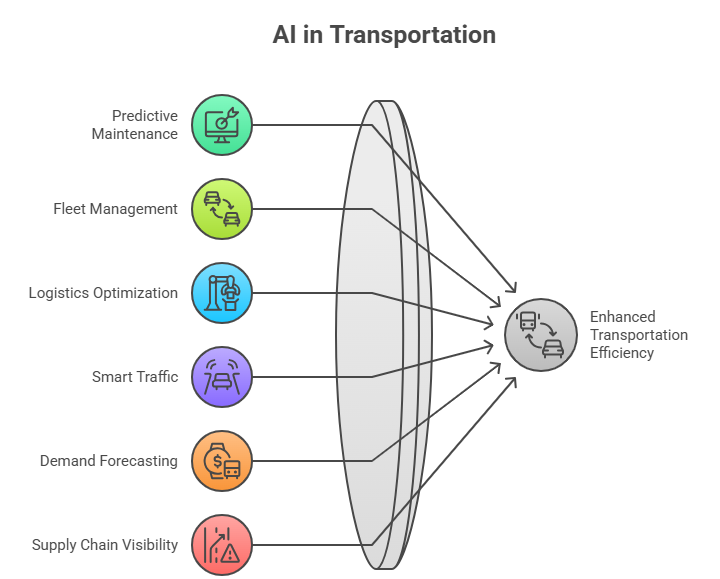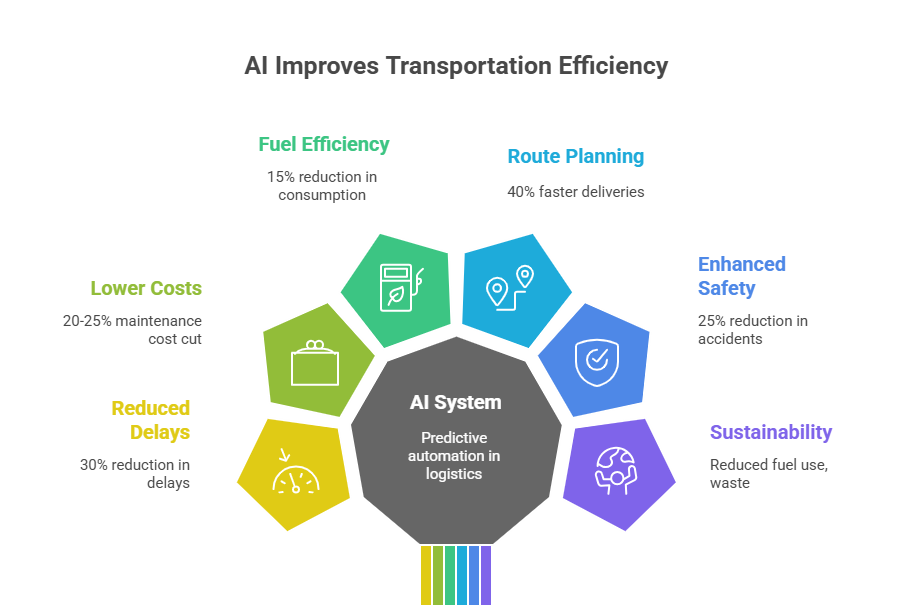AI in Transportation: How Predictive Automation Reduces Delays & Costs
Introduction
The transportation industry is entering a new era where data-driven intelligence defines success. From freight logistics to urban mobility, companies are increasingly turning to AI in Transportation to streamline operations, forecast disruptions, and enhance reliability.
Traditional systems often react to problems after they occur, delayed deliveries, unplanned breakdowns, or inefficient routes. Predictive automation changes this model entirely. By analyzing real-time data from vehicles, sensors, and supply chains, AI enables systems to anticipate issues before they happen. This shift from reactive to proactive management helps businesses cut costs, minimize downtime, and ensure on-time performance across the network.
In today’s fast-paced logistics environment, being able to predict and prevent problems gives organizations a powerful competitive advantage. Whether it’s optimizing fleet movement, forecasting demand, or automating maintenance schedules, AI-driven predictive systems are transforming how transportation operates, making it faster, safer, and more cost-efficient.
This blog explores how predictive automation is redefining transportation and logistics, the technologies powering it, and real-world examples proving its impact.

Figure: The AI in transportation market, valued at US$ 2.89 billion in 2022, is projected to grow at an 11.8% CAGR, reaching US$ 6.3 billion by 2029, driven by rising demand for efficient and cost-effective mobility solutions.
Key Statistics
- According to McKinsey, predictive AI can improve logistics forecasting accuracy by up to 50%, significantly reducing shipment delays.
- Recent studies show that AI-powered route optimization helps fleets save 10–15% on fuel costs while cutting delivery times.
- Predictive maintenance systems in transportation can reduce unplanned downtime by up to 30% and extend vehicle lifespan.
- Research indicates that predictive automation can lower overall operational and maintenance costs by 20–25% in large transport fleets.
- AI-driven logistics automation has improved on-time delivery rates by up to 16% in global supply chains.
- AI adoption in transportation is projected to grow the global market from $3.5 billion in 2021 to over $27 billion by 2030.
What is AI in Transportation?
AI in Transportation uses technologies like machine learning and predictive analytics to make transport systems smarter and more efficient. It helps analyze real-time data from vehicles, sensors, and routes to predict delays, optimize operations, and improve decision-making.
Unlike traditional automation that reacts to issues, predictive automation anticipates them. It can forecast traffic, detect vehicle maintenance needs early, and plan faster routes. This shift from reactive to proactive management makes transportation networks more reliable and cost-effective.
In short, AI enables transportation systems to learn, adapt, and perform better with every journey, creating safer, faster, and more connected mobility experiences.
Key Use Cases and Real-World Applications
AI is transforming transportation, from predictive maintenance to route optimization. Let’s explore how it works.

a. Predictive Maintenance
AI-powered systems track vehicle health by analyzing sensor data such as engine temperature, brake pressure, and tire performance. Predictive maintenance helps identify issues before breakdowns occur, reducing downtime and extending fleet lifespan.
b. Fleet Management
Predictive automation enables smarter scheduling, route optimization, and driver monitoring. With AI automation services, real-time analytics reduce unnecessary travel and fuel consumption while improving overall fleet productivity.
c. Logistics Optimization
Machine learning models forecast shipment demand, optimize cargo loading, and plan delivery schedules with greater accuracy. According to McKinsey, AI can improve logistics forecasting accuracy by up to 50%, helping businesses cut costs and deliver faster.
d. Smart Traffic and Autonomous Operations
AI supports adaptive traffic control and autonomous navigation by analyzing live traffic patterns. This leads to smoother traffic flow, fewer accidents, and more consistent travel times.
e. Demand Forecasting and Resource Planning
AI tools analyze historical patterns to predict transport demand. This helps logistics companies plan vehicles, drivers, and warehouse resources more effectively, reducing operational waste.
f. Supply Chain Visibility and Risk Management
Predictive analytics improve visibility across the entire logistics network. AI can detect potential risks such as weather disruptions or congestion, allowing companies to reroute shipments and maintain delivery timelines.
Also Read : AI in the Workplace: How Intelligent Systems Boost Employee Productivity by 50%
Benefits of AI in Transportation
AI is helping transportation companies cut costs, boost efficiency, and deliver faster than ever before. Here are the key benefits of using AI in Transportation and predictive automation:

1. Reduced Delays and Downtime
Predictive automation helps detect potential disruptions early. Studies show that AI-driven systems can reduce delivery delays by up to 30%, ensuring smoother logistics operations and higher customer satisfaction.
2. Lower Maintenance Costs
AI Predictive Maintenance models analyze vehicle data to forecast part failures. This reduces unexpected breakdowns and can lower maintenance costs by 20–25%, saving both time and repair expenses.
3. Better Fuel Efficiency
With optimized routes and real-time traffic analysis, AI helps fleets reduce fuel consumption by nearly 15%. Smarter driving patterns and automated scheduling contribute to a greener, more cost-efficient system.
4. Improved Route Planning
Machine learning models analyze thousands of route combinations to find the fastest and safest paths. Through machine learning development services, businesses using AI for route optimization report up to 40% faster deliveries and fewer missed shipments.
5. Enhanced Safety and Compliance
AI systems monitor driver behavior, road conditions, and vehicle health in real time. This proactive approach reduces accidents by up to 25%, while ensuring better compliance with safety standards.
6. Greater Sustainability
By reducing fuel use, idle time, and waste, AI supports eco-friendly transport practices. Predictive insights help companies meet sustainability goals while cutting carbon emissions across fleets.
Also Read : AI Agents in Logistics: Automating Supply Chain Management with Intelligence
Industry Case Studies: Predictive Automation in Action
AI in Transportation is already driving measurable impact across global logistics and mobility leaders. These case studies reveal how predictive automation enhances efficiency, reliability, and performance in real-world operations.
Tesla: AI for Predictive Maintenance and Autonomous Operations
Tesla leverages AI to analyze data from its connected fleet. By monitoring vehicle performance in real time, its predictive systems detect potential issues before they escalate and optimize driving conditions for safety and efficiency.
DHL: Intelligent Supply Chain Forecasting
DHL applies machine learning and AI tools to forecast shipment demand, reduce warehouse delays, and improve inventory management. This predictive approach enhances supply chain visibility and ensures smoother global operations.
Volvo Trucks: Predictive Maintenance for Vehicle Uptime
Volvo Trucks implements AI-powered predictive maintenance systems that track engine health, tire wear, and performance indicators. These insights help minimize downtime, extend vehicle lifespan, and improve overall fleet reliability.
BMW Group: Smart Maintenance Using AI
BMW Group integrates predictive analytics in its manufacturing processes to identify machinery faults early and prevent production interruptions. This AI-driven approach saves time, improves equipment performance, and enhances operational efficiency.
Siemens Mobility: AI-Powered Traffic Management Systems
Siemens Mobility utilizes AI-driven traffic optimization tools that analyze real-time city data to adjust traffic signals dynamically. This reduces congestion, lowers emissions, and improves public transportation efficiency in urban areas.
Challenges in Adopting AI for Transportation
While AI in Transportation delivers strong benefits, several adoption challenges continue to slow its full-scale implementation across fleets and logistics networks.
1. Data Integration and Legacy Systems
Many transport companies still depend on outdated IT infrastructure. Integrating data from vehicles, sensors, and logistics platforms into a unified AI system remains one of the biggest technical hurdles.
2. High Implementation and Setup Costs
Deploying AI requires major investment in infrastructure, hardware, and skilled personnel. Smaller operators often struggle to justify these upfront costs before seeing measurable ROI.
3. Model Accuracy and Compliance Concerns
AI systems rely on large, accurate datasets. Errors, data bias, or lack of transparency can reduce model accuracy and create compliance risks under transportation safety regulations.
4. Workforce Readiness and Training Gaps
AI adoption demands digital literacy and analytical skills. Many logistics teams still face challenges adapting to AI-driven tools and interpreting automated insights effectively.
5. Cybersecurity and Data Privacy Risks
Connected fleets and IoT-enabled systems increase the risk of data breaches. Protecting sensitive route, vehicle, and driver information is critical to maintaining trust and operational safety.
Also Read : AI in Drug Discovery: Revolutionizing Medicine Development and Accelerating Innovation
The Future of AI in Transportation
The future of transportation is moving toward full automation powered by intelligent, connected systems. Autonomous fleets and self-learning logistics networks will soon manage routes, predict disruptions, and optimize operations with minimal human input. These systems will communicate through predictive data-sharing ecosystems, where vehicles, traffic signals, and warehouses exchange insights in real time. Technologies like edge computing and 5G will make this data transfer faster and more reliable, enabling fleets to operate with precision and safety.
Generative AI will play a key role in simulating routes, traffic patterns, and fuel usage to create dynamic logistics plans before vehicles even move. Combined with AI-powered sustainability initiatives, transportation systems will become more energy-efficient and environmentally conscious. From predictive maintenance to carbon optimization, the next era of AI in Transportation will not only reduce costs but also pave the way for smarter, cleaner, and self-adapting mobility worldwide.
Why Choose Amplework for AI in Transportation
Amplework combines deep expertise in AI development and predictive automation to help transportation businesses achieve operational excellence. Our team designs intelligent solutions that optimize fleet management, reduce fuel costs, and enhance route planning using real-time data and machine learning models. With our AI consulting services, you gain systems that adapt, learn, and scale with your business needs.
Partnering with Amplework means choosing innovation, reliability, and measurable results. We focus on building future-ready AI ecosystems that integrate seamlessly with your existing infrastructure, improving efficiency, reducing delays, and driving long-term sustainability in logistics and transport operations.
Conclusion
Predictive AI is shaping the future of global transportation by driving efficiency, safety, and sustainability across every layer of the industry. From predictive maintenance and intelligent routing to autonomous operations, AI enables real-time decision-making that minimizes delays, reduces operational costs, and enhances passenger and cargo reliability. As predictive automation continues to evolve, it is transforming transportation systems into connected, self-optimizing networks that learn, adapt, and improve continuously. The integration of these intelligent technologies marks a decisive shift toward smarter, data-driven mobility—making predictive AI the road ahead for a faster, safer, and more sustainable transportation ecosystem.
FAQs
What is AI in Transportation?
AI in Transportation uses technologies like machine learning, predictive analytics, and computer vision to optimize routes, manage fleets, and enhance traffic systems. It helps transport businesses make faster, data-driven decisions.
How does predictive automation reduce transportation delays?
Predictive automation analyzes real-time data to detect potential delays, breakdowns, or route issues in advance. By addressing these early, transport systems can reroute vehicles or reschedule operations efficiently.
What are the key benefits of AI for logistics and fleet management?
AI improves route planning, reduces fuel consumption, minimizes maintenance costs, enhances delivery accuracy, and increases overall fleet reliability. It helps logistics companies achieve higher productivity and sustainability.
What challenges exist in adopting predictive AI for transportation?
The main challenges include data integration with older systems, high setup costs, workforce training gaps, and ensuring model accuracy while maintaining data security.
What does the future of AI in transportation look like?
The future points toward autonomous fleets, connected vehicles, and self-learning logistics systems. AI will also drive sustainable, energy-efficient transportation networks through predictive and generative technologies.
How is AI transforming public transit and infrastructure?
AI helps optimize bus and train schedules, predict passenger demand, manage traffic signals, and monitor infrastructure conditions, leading to smoother and safer urban mobility.
Is AI replacing human roles in transportation?
AI is not replacing humans but supporting them. It automates repetitive tasks while allowing professionals to focus on strategy, planning, and decision-making.
How does AI contribute to sustainable transportation?
AI enables fuel-efficient routing, smart traffic management, and optimized electric vehicle charging schedules, helping reduce emissions and energy consumption across transport systems.


 sales@amplework.com
sales@amplework.com
 (+91) 9636-962-228
(+91) 9636-962-228





